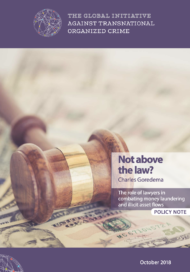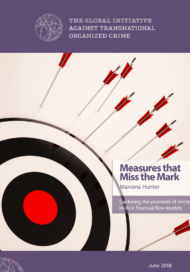Posted on 31 Oct 2018
Lawyers frequently find themselves caught between their obligations to governmental authorities and their fidelity to their clients. This becomes particularly problematic when, as intermediaries in business transactions, they become aware of, or are requested to facilitate, illicit financial flows (IFFs). Lawyers can become complicit in, or even initiate, economic crime, as the case studies in this report show. They may become complicit through negligence. The extent to which this occurs on a global scale was revealed by the Panama and Paradise papers, but it is of particular concern for developing economies, where such crimes can have especially devastating effects. Recognizing the dilemma lawyers face when caught between an oath to client confidentiality and a responsibility to report financial misconduct, this report suggests ways in which they might contribute to anti-money-laundering (AML) measures, in particular stressing the importance of client due diligence (CDD), the involvement of lawyers in national risk assessments and the need to tailor combating strategies to judicial environments.




